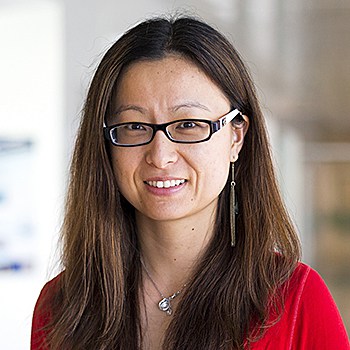
Fei Wen wins 2019 David E. Liddle Research Excellence Award
Young investigator in the field of personalized immunotherapy and biocatalysis is recognized for her achievements and innovation.

Young investigator in the field of personalized immunotherapy and biocatalysis is recognized for her achievements and innovation.
Professor Fei Wen has won the College of Engineering’s David E. Liddle Research Excellence Award for 2019. An assistant professor of chemical engineering and co-director of Immune Monitoring Shared Resources at the Rogel Cancer Center, Wen is a talented young investigator in protein engineering and biotechnology, who has not only demonstrated outstanding achievements in applying protein engineering principles to tackle global challenges in energy sustainability and precision health, but more impressively, her unique quantitative approach to these problems has also advanced the fundamental understanding of the complex protein self-assembly process and its functional consequences on living cells.

Wen has been instrumental in pushing the field of precision health forward. Within six years, she secured both external and internal funding in excess of $3 million and established a state-of-the-art CyTOF (Cytometry by Time-of-Flight) core facility at UM for performing single-cell immune profiling studies. Under her leadership, the CyTOF core has supported 13 internal and 21 external proposals and secured funding totaling >$6.5 million since 2016.
A leader in the field of personalized immunotherapy and biocatalysis, Wen has made outstanding contributions at the interface of protein engineering and immunology, synthetic biology, and biostatistics. She has proven exceptionally creative in synthesizing novel ideas originating from multiple STEM fields to address challenges in personalized immunotherapy.
Her work on cooperative biocatalysis via functionally related enzymes is innovative, introducing new strategies into the field that have enabled discovery of new molecular mechanisms; for example, her team revealed that the molecular crowding on a biocatalyst surface governs how efficiently enzymes assemble to perform their cooperative catalytic function.
More importantly, Wen’s work introduced a quantitative approach to the field of whole-cell biocatalyst engineering with far-reaching impact on multiple fronts including benchmarking whole-cell catalytic performance across different laboratories, enabling quantitative model development predictive of new biocatalyst design, and shifting the field from trial-and-error to rational design.
This CoE Research Excellence Award is the latest addition to a growing list of Wen’s professional accolades, such as the 2014 Dow Corning Assistant Professorship, 2016 invitee of the NAE’s Frontiers of Engineering Education Symposium, 2016 UM Provost’s Teaching Innovation Prize, 2017 NSF CAREER Award, and 2018 Class of Influential Researchers by ACS’s Industrial & Engineering Chemistry Research.